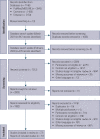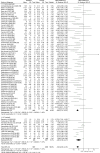Cardiorespiratory fitness in individuals with type 2 diabetes mellitus: a systematic review and meta-analysis
- PMID: 37738467
- PMCID: PMC10665050
- DOI: 10.20945/2359-4292-2023-0040
Cardiorespiratory fitness in individuals with type 2 diabetes mellitus: a systematic review and meta-analysis
Abstract
Objective: To conduct a systematic review and meta-analysis assessing the cardiorespiratory fitness (CRF) among individuals with and without type 2 diabetes.
Materials and methods: The current review was registered in PROSPERO under the number CRD42018082718. MEDLINE, EMBASE, and Cochrane Library databases were searched from inception through February 2022. Eligibility criteria consisted of observational or interventional studies that evaluated CRF through cardiopulmonary exercise testing or six-minute walk test in individuals with type 2 diabetes compared with individuals without type 2 diabetes. For data extraction, we used baseline CRF assessments of randomized clinical trials or follow-up CRF assessments in observational studies. We performed a meta-analysis using maximal oxygen consumption (VO2 max), and distance walked in the 6MWT as primary outcomes. They were extracted and expressed as mean differences (MDs) and 95% CIs between treatment and comparator groups. The meta-analysis was conducted using Review Manager (RevMan) software.
Results: Out of 8,347 studies retrieved, 77 were included. Compared with individuals without type 2 diabetes, individuals with diabetes achieved a lower VO2 max (-5.84 mL.kg-1.min-1, 95% CI -6.93, -4.76 mL.kg-1.min-1, p = <0.0001; I2 = 91%, p for heterogeneity < 0.0001), and a smaller distance walked in 6MWT (-93.30 meters, 95% CI -141.2, -45.4 meters, p > 0.0001; I2: 94%, p for heterogeneity < 0.0001).
Conclusion: Type 2 diabetes was associated with lower cardiorespiratory fitness, as observed by lower VO2 max on maximal tests, and smaller distance walked in 6MWT, however the quality of studies was low.
Keywords: Exercise tolerance; diabetes mellitus; meta-analysis; review.
Conflict of interest statement
Disclosure: no potential conflict of interest relevant to this article was reported.
Figures
Similar articles
-
Developing and validating equations to predict O2 peak from the 6MWT in Childhood ALL Survivors.Disabil Rehabil. 2021 Oct;43(20):2937-2944. doi: 10.1080/09638288.2020.1725159. Epub 2020 Feb 11. Disabil Rehabil. 2021. PMID: 32045540 Clinical Trial.
-
Classification of cardiorespiratory fitness using the six-minute walk test in adults: Comparison with cardiopulmonary exercise testing.Pulmonology. 2021 Nov-Dec;27(6):500-508. doi: 10.1016/j.pulmoe.2021.03.006. Epub 2021 May 4. Pulmonology. 2021. PMID: 33958319
-
Cardiorespiratory Fitness and Physical Activity in Pediatric Diabetes: A Systemic Review and Meta-Analysis.JAMA Netw Open. 2024 Feb 5;7(2):e240235. doi: 10.1001/jamanetworkopen.2024.0235. JAMA Netw Open. 2024. PMID: 38393727 Free PMC article.
-
Stronger correlation of peak oxygen uptake with distance of incremental shuttle walk test than 6-min walk test in patients with COPD: a systematic review and meta-analysis.BMC Pulm Med. 2022 Mar 24;22(1):102. doi: 10.1186/s12890-022-01897-0. BMC Pulm Med. 2022. PMID: 35331171 Free PMC article.
-
The Distance Covered in Field Tests is more Explained by Walking Capacity than by Cardiorespiratory Fitness after Stroke.J Stroke Cerebrovasc Dis. 2021 Sep;30(9):105995. doi: 10.1016/j.jstrokecerebrovasdis.2021.105995. Epub 2021 Jul 18. J Stroke Cerebrovasc Dis. 2021. PMID: 34289432
Cited by
-
Independent influence of type 2 diabetes on reduced cardiopulmonary fitness in patients after percutaneous coronary intervention: a cross-sectional study.Sci Rep. 2025 Feb 19;15(1):6071. doi: 10.1038/s41598-025-90281-z. Sci Rep. 2025. PMID: 39972067 Free PMC article.
-
Aerobic exercise as a non-pharmacological intervention for improving metabolic and hemodynamic profiles in type 2 diabetes.Ir J Med Sci. 2024 Dec;193(6):2781-2790. doi: 10.1007/s11845-024-03783-6. Epub 2024 Aug 19. Ir J Med Sci. 2024. PMID: 39158674
References
-
- Zafrir B, Azaiza M, Gaspar T, Dobrecky-Mery I, Azencot M, Lewis BS, et al. Low cardiorespiratory fitness and coronary artery calcification: Complementary cardiovascular risk predictors in asymptomatic type 2 diabetics. Atherosclerosis. 2015 Aug;241(2):634–640. doi: 10.1016/j.atherosclerosis.2015.06.020. - DOI - PubMed
-
- Balducci S, Zanuso S, Cardelli P, Salvi L, Mazzitelli G, Bazuro A, et al. Changes in physical fitness predict improvements in modifiable cardiovascular risk factors independently of body weight loss in subjects with type 2 diabetes participating in the Italian Diabetes and Exercise Study (IDES) Diabetes Care. 2012 Jun;35(6):1347–1354. doi: 10.2337/dc11-1859. - DOI - PMC - PubMed
Publication types
MeSH terms
LinkOut - more resources
Full Text Sources
Medical
Research Materials
Miscellaneous




